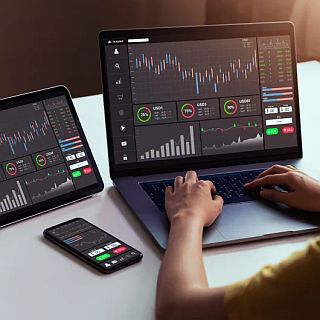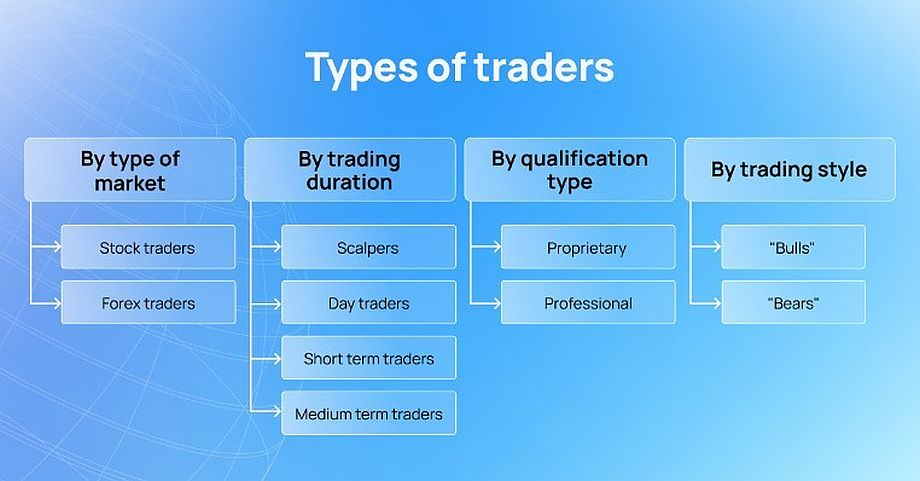Traders: who they are and what they do
Recently, we told you about trading in financial markets. As a reminder, trading is the conduct of financial transactions to buy or sell assets in order to make a profit by changing their value. Traders, also known as market participants, are in charge of concluding transactions.
Continue reading to find out who traders are, what traders are and what they do.
Who is a Trader?
A trader is a participant in the financial market who makes transactions to buy or sell assets. These may be currency pairs, indexes, futures contracts, cryptocurrencies, stocks, bonds, etc. The trader earns profit from the price difference between buying and selling the asset. For example, the quotes of currency pairs on Forex are constantly changing, which gives traders the opportunity to buy an asset at a lower price and then sell it at a higher one by choosing the best time.
The main task of a trader is not just trading, but making a profit through deals. To make the deals successful, a trader needs to study a lot. Basic knowledge includes understanding how the market works, deciding an asset for trading and the direction of a deal (buy or sell), and understanding how orders work on the currency market.
Besides, a trader should master basics of technical and fundamental analysis, know how to form and stick to the chosen trading strategy, determine entry points and optimal time for closing deals as well as manage risks.
Types of traders
Traders are divided into several categories:
– by type of financial market;
– by duration of trading;
– by type of qualification;
– by trading style.
Let’s take a closer look at each category.
By type of financial market: stock and Forex traders
Stock Market Traders
When trading in the stock market, traders invest in stocks or bonds, ETF funds or stock indexes. Stock market securities are bought with the goal of making a profit in the future when their price is higher than their purchase price.
Forex traders
The high volatility and liquidity of the Forex market gives traders the opportunity to buy and sell currency pairs at the best price at any time. The main objective is to buy or sell currency pairs in order to make a profit. If the price of a currency pair changes according to the trader’s forecast, the trader makes a profit; if it does not, the trader takes a loss.
To minimize risk, Forex traders use trade orders that allow them to automatically close or open trades at the optimal time. For example, with a stop-loss order, a trade will automatically close at a price set by the trader if the value of the asset moves in a negative direction.
By duration of trades: day traders, scalpers, short-term traders, midterm traders
Day traders
The deals of day traders are limited to one trading day. In other words, they perform all the operations during the day, but all the deals are closed at the end of the trading day.
Scalpers
Their main task is to conclude a great number of deals during a day that may amount to hundreds or thousands. The duration of such transactions does not exceed several minutes, sometimes even seconds. In this way, traders gain profit by making the smallest price changes. This strategy may seem to be inefficient at a first glance, but in case of a great number of deals a trader receives considerable income.
Short-Term
They are also called “position traders”. Such traders open deals of many days duration and close them before weekends or holidays to take profit.
Midterm
They earn by monitoring weekly trends and open trades when they change. Midterm traders make several dozens of trades per year.
By qualification type: private and professional traders
Private
Retail traders who have basic knowledge and skills of trading on financial markets. As a rule, private traders are engaged in trading in their spare time and make small profits. The knowledge they gain from trading with demo accounts where they can practice trading with virtual money.
Professional
Experienced traders who have a deep knowledge of the foreign exchange market. They understand in which situations to use one or another strategy and are proficient in carrying out fundamental and technical analysis. They also dedicate all their working time to trading because it is their main source of income.
By trading style: “bulls” and “bears”
The value of assets in the currency market is constantly changing. Market participants are divided into two types: “bulls” and “bears”. These animals represent the price situation on the market, and they are chosen for a reason: bulls attack their opponents by throwing them into the air and bears throw their prey on the ground. Bulls and bears operate in the same way in the currency market.
“Bulls”
Traders who anticipate a rise in price and buy assets, making a profit when the value rises. Thus, “bulls” trade on price appreciation.
“Bears”
Traders who predict a fall in price and sell assets. If the number of “bears” prevails, quotations fall, which gives an opportunity to buy an asset at a low price in order to sell it later at a higher price.
Trader’s outlook and income
Trader’s income directly depends on the initial deposit amount, trading strategy decided and trader’s skills and knowledge. The more knowledge about the financial markets a trader has, the higher profit he can make.
It is very important for a trader to be stress-proof, not to buy/sell impulsively, to have analytical and critical thinking in order to analyze and forecast the situation based on the data. To be successful in trading, you need to be constantly aware of everything that is happening in the stock market in general and with the assets you buy in particular. It is essential not only to know this information, but also to interpret it correctly.
If the trader constantly learns and applies the knowledge in practice, the profitability and future prospects will only increase.


